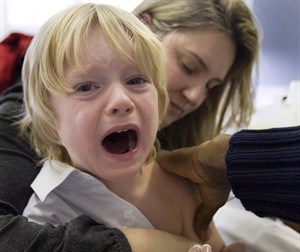
Evan Tordorf, 4, cries as he gets his flu shot as his mother and Karen Joly looks on at a H1N1 vaccination centre Friday, November 6, 2009 in Montreal. A new study from Quebec suggests the flu vaccine used in the 2009 pandemic may have led to a slight increase in cases of Guillain-Barre syndrome in the province. The research suggests that use of the vaccine likely led to a doubling of the rate of cases of the rare neurological condition. But the authors of the article say that even with the increase in Guillain-Barre cases, the benefits of the vaccination probably outweighed the risk for Quebecers. THE CANADIAN PRESS/Ryan Remiorz
July 10, 2012 - 4:07 PM
TORONTO - A new study from Quebec suggests the flu vaccine used in the 2009 pandemic may have led to a slight increase in cases of Guillain-Barre syndrome in the province.
The research suggests that use of the vaccine likely led to a doubling of the rate of cases of the rare neurological condition.
But the authors of the article say that even with the increase in Guillain-Barre cases, the benefits of the vaccination probably outweighed the risk for Quebecers.
Guillain-Barre, which triggers a progressive but generally reversible paralysis, can be caused by a number of things, including some infections.
For years there have been questions about whether getting a flu shot increases one's risk of developing the condition, but numerous studies have produced conflicting results.
Guillain-Barre cases occur at a rate of about two per million people in a population per month and that rate appeared to have been doubled in the six-month period after Quebec's pandemic flu shot campaign.
First author Philippe de Wals, a professor of community health at Laval University, says the increased risk only appeared in people over the age of 50.
An influenza expert from the University of Michigan says the study was well done, but the results can't definitely answer the lingering question of whether a flu shot increases one's risk of developing GBS, as the condition is often called.
Dr. Arnold Monto says some studies point to elevated rates among flu shot recipients and others do not.
"It's new wine in old bottles or the reverse," Monto says.
"It confirms what we have suspected all along, that there may be a low risk.... And the low risk, if present, is no different with adjuvanted than non-adjuvanted vaccine."
"The questions still remain."
An adjuvant is a compound that boosts the immune response triggered by a vaccine, allowing smaller doses to be used for each person.
Canada used adjuvanted flu vaccine for the first time during the 2009 pandemic. The U.S. used unadjuvanted vaccine. But a study from the U.S. Centers for Disease Control also found a slight elevation of the rate of GBS cases after that country's pandemic vaccination campaign.
A study in Britain, where adjuvanted vaccine was used, found no increased risk.
News from © The Canadian Press, 2012